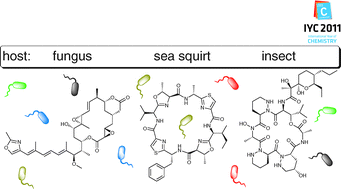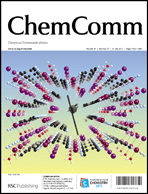Bacterial symbionts and natural products
Abstract
The study of bacterial symbionts of eukaryotic hosts has become a powerful discovery engine for chemistry. This highlight looks at four case studies that exemplify the range of chemistry and biology involved in these symbioses: a bacterial symbiont of a fungus and a marine invertebrate that produce compounds with significant anticancer activity, and bacterial symbionts of insects and nematodes that produce compounds that regulate multilateral symbioses.

- This article is part of the themed collection: Highlights in Chemistry

 Please wait while we load your content...
Please wait while we load your content...